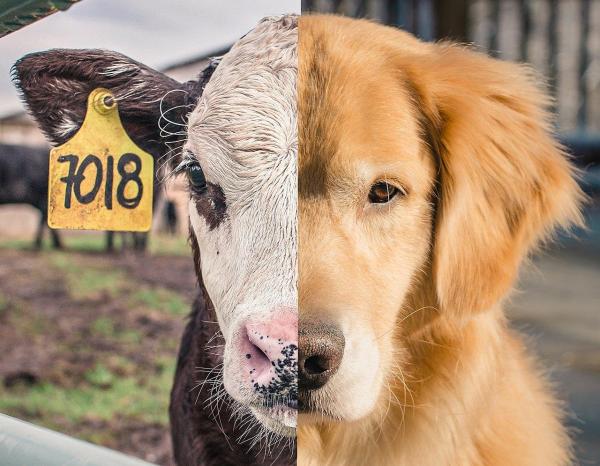What is Speciesism? - Meaning and Examples


Discrimination means treating someone differently and unfavorably because of conditions such as their gender, ideas, politics, religion, or skin color. There are many forms of discrimination within the human species, known by names such as sexism and racism.
In this article by thedailyECO, we'll discuss another type of discrimination, speciesism, which refers to the unequal moral treatment of individuals who don't belong to a certain species.
What exactly is speciesism?
The term "speciesism" was first defined in 1975 by philosopher Peter Singer as:
"A prejudice or attitude of bias in favor of the interests of members of one's own species and against those of members of other species."
In other words, speciesism is a form of discrimination by humans against non-human animals, based on feelings of superiority, domination, violence, and cruelty toward them. It's important to clarify that this discrimination doesn't necessarily stem from "hatred" or "wanting to cause harm," but includes not giving importance to or ignoring the harm or benefit we might cause animals through our behavior toward them.
Speciesism is so deeply rooted in society that humans exploit non-human animals daily without considering it an act of discrimination, whether through consumption, clothing, labor, pharmaceutical and cosmetic industries, or many other practices. Even among non-human animals, humans show differential treatment, because pets like dogs and cats are typically treated with greater respect than domesticated animals raised for consumption.
The concept of speciesism has evolved significantly since its introduction in the 1970s, with ongoing philosophical debate about its meaning and implications. Central to these discussions is the question of how we determine moral worth and what factors should influence our ethical treatment of different beings. These philosophical questions have had consequences for how we structure our relationships with animals in various contexts.
The origins and history of speciesism
The questioning of humanity's relationship with animals has historical roots across cultures. If we go back many years in Western history, thinkers like Pythagoras, Plutarch, and Porphyry had already begun to question the relationship between humans and other animals, criticizing animal mistreatment and even questioning the practice of killing animals for food.
Simultaneously, various Indigenous and Eastern philosophical traditions developed their own complex perspectives on human-animal relationships, often emphasizing interconnectedness rather than hierarchy.
Following a timeline, during the Middle Ages in Europe, this issue wasn't given much relevance in mainstream philosophy, though some religious orders maintained traditions of compassion toward animals. It wasn't until the 18th and 19th centuries that numerous philosophical publications began discussing moral concerns about the treatment of animals.
The rise of industrialization during this period also dramatically changed human-animal relationships, as animals increasingly became units of production rather than living beings with whom humans directly interacted.
In 1892, Henry Salt published "Animals' Rights: Considered in Relation to Social Progress," criticizing slaughter, experimentation, hunting, and the fur industry for both domestic and wild animals, arguing that animals should have rights. Salt's work influenced generations of animal advocates and laid groundwork for future movements.
Moving to 1970, the term "speciesism" was first coined by Richard Ryder in a privately printed leaflet he distributed in Oxford as a protest against animal experimentation. This occurred during a period of significant social activism, alongside other movements challenging established hierarchies and systems of oppression.
It was at this point that, in addition to questioning animal rights, the public became increasingly aware of industrial practices such as factory farming, laboratory experiments with animals, vivisections in biomedicine, and the cosmetic industry's testing methods.
In 1978, the International League of Animal Rights proclaimed the Universal Declaration of Animal Rights, which serves as an inspiration for the development of legislative texts in each country. Since then, there have been significant legal developments in many nations, from bans on certain forms of animal testing to recognition of animal sentience in constitutional and legal frameworks.
The late 20th century saw the growth of organized animal rights activism, with groups like PETA (founded 1980) and the Animal Liberation Front bringing these issues into mainstream consciousness through sometimes controversial tactics.
Did you know there's an international observance specifically created to promote animal rights and celebrate our relationships with other species? Find out when and how it's commemorated in our related article.

Arguments against speciesism (Anti-speciesism)
The term "anti-speciesist" refers to people who oppose morally different treatment toward animals and non-human species.
There are two major groups within anti-speciesists, though many philosophers and activists fall somewhere along a spectrum between these positions:
- Welfarists: they support using non-human animals as resources but advocate for humane treatment, focusing on reducing suffering within existing systems.
- Abolitionists: they are completely against animal exploitation in any form, arguing that using animals as means to human ends is inherently unethical.
In both cases, some of the arguments include:
Sentience:
Animals have the capacity to feel pleasure, pain, and enjoyment. They've also managed to communicate, possess various degrees of intelligence, and have morally relevant interests that shouldn't be considered less important than ours.
Anti-speciesists argue that the capacity to suffer, not cognitive complexity, should be the primary consideration in moral decision-making.
Equal consideration of interests:
The basic interest of every living being is to preserve life and avoid suffering. Anti-speciesists contend that speciesism is biased, placing human life above non-human life, irrationally discriminating without considering the desire to live. They argue that speciesism doesn't fulfill the principle of basic interest equality and is therefore invalid.
Marginal cases:
This philosophical position points out that if we grant full moral consideration to humans with severe cognitive impairments, consistency demands we extend similar consideration to animals with comparable or greater cognitive abilities.
Anti-speciesists maintain that if "marginal human cases" are included in moral respect, then non-humans should also receive that respect, as they may possess similar capacities for suffering and well-being.
Environmental and sustainability:
Some anti-speciesists highlight how industrial animal agriculture and exploitation contribute to environmental degradation, habitat destruction, and climate change, arguing that speciesist practices harm not only animals but also human prospects for long-term survival.
Beyond ethical considerations, the very definition of 'animal' shapes how we view countless living beings. Expand your knowledge with our exploration of the biological attributes and gray areas that determine which organisms qualify as animals.

Arguments supporting speciesism
On the other side of this ethical debate are those who defend various forms of speciesist thinking. Like anti-speciesists, those who support some form of speciesism represent diverse philosophical positions rather than a single unified view.
While contemporary philosophers rarely defend extreme forms of speciesism that disregard animal interests entirely, many argue for giving greater moral consideration to humans in certain contexts.
Some of the main arguments put forward to support forms of speciesism include:
Species solidarity:
Many argue that humans naturally feel more empathy for individuals of their own species and that this preferential treatment is both natural and morally justified. This position suggests that special obligations to members of our own species aren't arbitrary but rooted in meaningful relational bonds.
Cognitive capacity:
Some philosophers contend that humans' greater cognitive abilities, including advanced reasoning, self-awareness, language, and moral agency, justify giving human interests priority in certain cases. This argument doesn't necessarily deny moral consideration to animals but suggests different levels of consideration based on relevant capacities.
Religious and cultural:
Various religious traditions maintain that humans have a special status or purpose in creation. These viewpoints often still emphasize responsibilities toward animals, but maintain a hierarchical relationship where humans have both authority over and duties toward other species.
Social contract theory:
Some philosophers argue that since animals cannot participate in social contracts or reciprocal moral relationships, they fall outside the direct scope of certain moral obligations, though humans may still have indirect duties regarding their treatment.
Practical necessity:
Some defend certain forms of speciesism on pragmatic grounds, arguing that functioning human societies require prioritizing human interests in many contexts, even while working to minimize unnecessary animal suffering.

Examples of speciesism
Speciesism isn't just a philosophical concept, it shows up in how we interact with animals daily. Most of us can spot this in the way we treat different species inconsistently.
Consider how dogs and cats are family members with legal protections, while pigs and cows, despite similar intelligence, live in factory farms. Likewise, we pour resources into saving pandas and elephants while ignoring less attractive yet crucial species like insects and amphibians.
This double standard carries over to our food choices, where about 200 million chickens are killed daily worldwide, totaling 80-92 billion land animals annually. Add aquatic animals, and this number soars into the billions. Since 1970, global meat production has nearly tripled, even as plant-based alternatives have become widely available.
The same pattern appears in laboratories, where millions of animals are used yearly for research. About 95% are rodents who receive minimal protection, while primates, which account for less than 1% of test subjects, get far more ethical consideration. This ranking reveals which animals we value based largely on their resemblance to humans or emotional appeal.
Beyond labs and farms, animals entertain us in zoos, circuses, and races, or become fashion items as fur and leather. Our legal systems further reinforce this hierarchy by classifying animals as property with varying levels of protection depending on whether they're labeled pets, test subjects, or food.
Did you know that our treatment of farm animals has profound implications for our planet? Discover the connections between animal ethics and environmental sustainability in our related article.
If you want to read similar articles to What is Speciesism? - Meaning and Examples, we recommend you visit our Society and culture category.
- Bruers, S. (2015). The core argument for veganism. Philosophia, 43(2), 271-290. https://doi.org/10.1007/s11406-015-9595-5
- Caviola, L., Everett, J. A., & Faber, N. S. (2019). The moral standing of animals: Towards a psychology of speciesism. Journal of Personality and Social Psychology, 116(6), 1011-1029. https://doi.org/10.1037/pspp0000182
- Food and Agriculture Organization. (2023). Animal production. United Nations. https://www.fao.org/animal-production/en/
- Horta, O. (2010). What is speciesism? Journal of Agricultural and Environmental Ethics, 23(3), 243-266. https://doi.org/10.1007/s10806-009-9205-2








